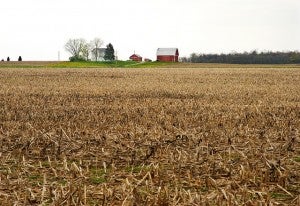The Ohio General Assembly will vote next week on legislation that aims to address the problem of nutrient pollution, which was responsible for a massive algae bloom in Lake Erie that contaminated the drinking water of more than 400,000 Ohio residents this past August.
In short, the bill would ban application of fertilizer on land that is frozen, covered by snow, saturated with rain, or when the weather predicts a certain amount of rainfall. Those who violate the ban could face penalties of up to $10,000.
Policies that set rational ground rules for when farmers can apply fertilizer to their fields and that create real incentives to reduce nutrient pollution are important, but it’s going to take more than legislation to solve the runoff problem.
Engaging the private sector
We’ve found that an effective way to tackle this issue is to work directly with farmers, retailers and food companies to find solutions that are both economically and environmentally feasible. Economic and market-driven signals can really take smart, sustainable practices to scale.
That’s why at EDF, we work with the private sector to incorporate effective fertilizer optimization and soil health methods into corporate supply chain goals for sourcing sustainable grains. Tailoring nutrient management techniques to farmers’ individual needs can also help them to be more precise about their inputs. After all, farmers don’t want to send fertilizer downstream either. This will go a long way towards reducing runoff, without sacrificing yield.
Working with farmers
Here in Ohio, the state’s Corn Marketing Program and Small Grains Marketing Programs are supporting farmer networks and on-farm research to test out new practices that apply nutrients more efficiently. Farmers voluntarily conduct research on their fields to better understand how to achieve greater efficiencies in nutrient management, which ultimately means less runoff into Lake Erie.
As my colleague David Festa noted in a recent blog post, farmers can play a key role in protecting our nation’s waterways and drinking water. It’s hard to argue with common sense regulations about when to apply fertilizer, but in order to have a real impact, farmers need to help inform policy decisions that protect their lands and meet the world’s growing demands for food production.










